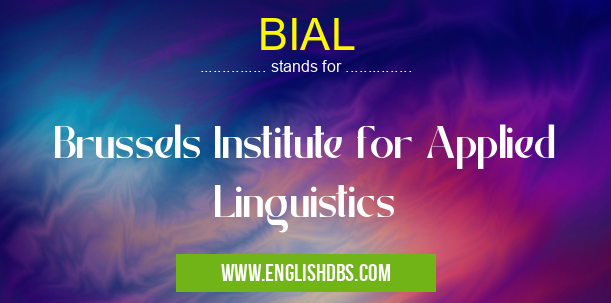What does BIAL mean in LINGUISTICS
BIAL stands for the Brussels Institute for Applied Linguistics, a research center specializing in applied linguistics in Belgium. This institute is dedicated to fostering and promoting applied linguistic studies both in the academic and business sectors. The institution serves as a source of information, research, training, and awareness on topics related to the field of applied linguistics. BIAL also offers continuing education as well as graduate-level courses to students from all over the world.

BIAL meaning in Linguistics in Academic & Science
BIAL mostly used in an acronym Linguistics in Category Academic & Science that means Brussels Institute for Applied Linguistics
Shorthand: BIAL,
Full Form: Brussels Institute for Applied Linguistics
For more information of "Brussels Institute for Applied Linguistics", see the section below.
Background
The Brussels Institute for Applied Linguistics (BIAL) was founded in 1988 with the intention of becoming an international hub of research and training on language-related topics. Its founders were believers that language should not limit people, rather it should be used to bridge gaps between cultures and help bring people together from all walks of life. Since its inception, BIAL has grown to become one of Europe’s leading centers devoted to applied linguistics studies. It has also developed relationships with universities across the world to further its reach into different markets and expand its scope in terms of teaching, studying, researching, and outreach activities.
Research & Training Activities
Over the years BIAL has been involved in numerous research projects focused on learning outcomes such as language assessment processes and test design; approaches to teaching second languages; language development in second-language learners; strategies for developing multilingual proficiency; communication strategies for business cultures; social dynamics within international communities; discourse analysis; machine translation systems; language technology tools; the use of multimedia formats in foreign language instruction; curriculum design & evaluation methods for online education environments. In addition to providing insight into areas like these, BIAL also provides consulting services that involve development support and guidance when implementing projects related to linguistics topics such as translation technologies or bilingual assessments.
In addition to research activities, BIAL also organizes regular workshops throughout Europe which are designed for linguists working at all levels who are interested in exploring areas related to applied linguistics such as translation, discourse analysis or language teaching methods That offer opportunities for them network with other professionals working within similar disciplines all while enriching their knowledge base by attending lectures and presentations lead by experts from various fields.
Essential Questions and Answers on Brussels Institute for Applied Linguistics in "SCIENCE»LINGUISTICS"
What is Brussels Institute for Applied Linguistics?
The Brussels Institute for Applied Linguistics (BIAL) is a research and development institute that focuses on the study of language in real-life settings. BIAL works to provide innovative solutions to problems related to language teaching, learning, assessment, and policy.
What type of research does BIAL conduct?
BIAL conducts research on language in a variety of contexts such as multiculturalism, multilingualism, intercultural communication, and language teaching and learning. It provides evidence-based answers to key questions in applied linguistics.
How can I contact BIAL?
You can contact BIAL via email ([email protected]), telephone (+32 2 280 65 00), or by mail at Jules Moretuslei 300, 2610 Wilrijk, Belgium.
Does BIAL offer any internships?
Yes! BIAL offers internships to students interested in gaining experience in the field of applied linguistics. Opportunities include positions within the research teams as well as administrative roles. To apply for an internship at BIAL, please visit their website at www.bial.be/en/internees/.
How does BIAL work with communities?
In order to ensure that its research has meaningful impact on communities, BIAL partners with local organizations to develop projects that build bridges between academia and languages users in the region. These projects are designed to empower communities through linguistic rights and access to education resources and knowledge production opportunities.
What services does BIAL offer?
BIAL offers a range of services such as professional language skills assessment tools, training seminars, language teaching resources, consultation services related to language policy formulation and implementation, capacity building activities for teachers and learners of second or foreign languages, qualitative linguistic analyses of text corpora from various domains and cultures, etc.
Does BIAL organise events?
Yes! Alongside its regular activities such as workshops and conferences about current issues in applied linguistics, BIAL also organises special events such as summer schools for university students on topics like bilingualism or endangered languages.
Who works at Brussels Institute for Applied Linguistics?
At the Brussels Institute for Applied Linguistics there is a staff composed by researchers with academic backgrounds inthe fields of sociology of language , psychology , communication studies , history , cultural studies , management sciences , educational sciences , economics , computer science.
Final Words:
Overall it is clear that BIAL is committed to contributing significantly towards improving communication through languages across all aspects of society by bringing top researchers together from around the globe under one roof so they can make a collective effort towards reaching this goal. With its advanced facilities and extensive experience in providing educational programs dedicated solely towards understanding how languages work better , BIAL is well equipped with the tools necessary turning theoretically-driven ideas into tangible results that can benefit society on a more global scale.
